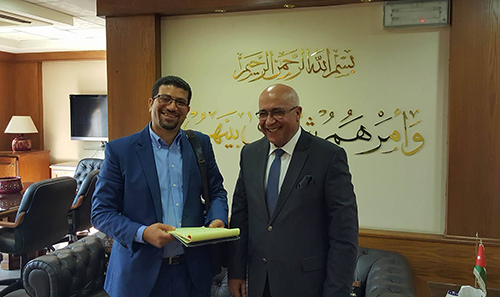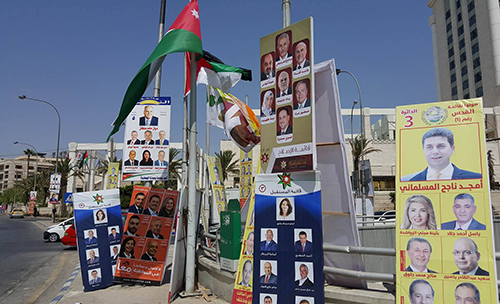Sitting uncomfortably in her chair because of a soccer injury, the Jordanian radio host Diala Dabbas said, “I know we are banned from talking about the king, his family, and the divine, but now I am also afraid to talk about anyone else who could be considered a ‘religious symbol’.”
Dabbas was injured while taking a forced hiatus earlier this month from her daily morning radio show “Kabsa,” which translates roughly as “Hassle.” Jordan’s Media Commission banned her show on the local station Sawt Elghad for two weeks for misrepresenting and insulting the country’s religious authority, the Grand Mufti Abdul Karim Khasawneh, during a broadcast on July 31.
Dabbas told me that since her return to the airwaves she has felt an increase in censorship, with certain political and religious discussions becoming more and more off limits. This sentiment was repeated by several journalists and analysts with whom I met in Jordan last week, to discuss the media environment ahead of the parliamentary elections scheduled for September 20.
Just this week, the Media Commission, the government agency responsible for enforcing press laws and regulations, issued a memo to news outlets stating that no news can be published about the king or the royal family unless it has been sent by the media unit of the royal court. Those ignoring the order will be “subject to liability,” the memo said, without specifying what penalties journalists could face.
This type of government censorship has been ongoing for a couple of years and comes in the context of a spike of arrests in 2014 and 2015. Many of the journalists I spoke with referenced a tally by the local news website 7iber of 15 gag orders since 2014. Lina Ejeilat, the editor of 7iber and a member of CPJ’s Middle East and North Africa Advisory Group, attended several of the meetings that I had with officials during the trip.
7iber’s count does not include an order issued August 28, banning coverage of the detention of a preacher called Amjad Qourshah. But it does list an order in August that banned coverage of the arrest of the left-leaning commentator Nahed Hattar. Both are cases that several of the journalists with whom I met said were part of the government’s attempts to control public discussions from the far left and far right to “moderate” political competition ahead of the polls.
Qourshah has been held since June over a series of videos posted to social media, including a video on his Facebook page in October 2014, in which he asked army and intelligence leaders not to participate in the war against the Islamic State militant group, and undated videos posted to YouTube that showed him addressing students and complimenting unnamed Islamic State leaders. His detention, on unspecified charges, has been renewed six times. When the media commission issued its publishing ban this week, it cited the country’s press and publication law according to local news reports.
In Hattar’s case, the left-wing political commentator and columnist who has previously contributed to online news websites including al-Akhbar and Maysaloon, turned himself in on August 13, 2016 after a warrant for his arrest was issued for “insulting religion” under article 278 of the penal code, according to reports. The charge is in connection with a cartoon he shared on Facebook on August 12 depicting a bearded man in bed with two women in Heaven, who is ordering God to serve him wine and food. On August 14, the public prosecutor issued a gag order preventing reporting on the case and warned that violators would be pursued, the government news agency Petra reported.
I tried to meet with the head of the Media Commission, Amjad al-Qadi, during my trip to Amman, but my emails and phone calls were not returned. A spokesperson from his office said that al-Qadi was busy organizing a regional media conference. However, I was able to meet with several government officials to inquire about Jordan’s commitment to freedom of speech and the government’s promises to embrace media freedoms in the wake of the Arab Spring, when the king had called for “sky-high” freedoms.

The officials renewed the government’s verbal commitments to press freedom and expressed a willingness to reform restrictive laws with the next elected parliament. They defended the role of the government as an arbitrator of public debate at a time when the country is facing challenges, including the fight against terrorism and an economy embattled by floods of immigrants arriving from neighboring countries.
Musa Maaytah, the Minister of Political and Parliamentary Affairs, said, “The government is open to reconsider any topic related to public freedoms if we see any mistake or need for improvement.” Maaytah said that human rights groups needed to recognize that “the spread of extremism and terrorism, which have hit the region and the world hard, compels us to new responsibilities and a steady commitment to consider, establish, and reinforce the right to life as the first and most important human right.”
Mohammad al-Momani, the Minister of State for Media Affairs and a government spokesperson, assured me that Jordan has a deep commitment to freedom of expression. He said, “Freedom of the press is a pillar of national security. This was reiterated throughout, from his majesty the king to the prime minister.” Al-Momani justified the increasing number of gag orders by saying that the state needed to preserve its laws to protect “the sanctity of ongoing trials” and that the government had to stop racial and religious incitement and ensure citizens are protected from hate speech, particularly in the cases of the journalists Dabbas and Hattar.
For Dabbas, it was more a case of relieving pressure in dealing with a seemingly controversial chord in Jordan: whether society is ready to openly discuss prejudice and extreme views that some have about inter-faith relations between the overwhelming majority of Muslims and the small percentage of Christian citizens, the ministers said. Dabbas had criticized the grand mufti over a fatwa he issued allowing for condolences to be extended to non-Muslims, including a 17-year-old Christian musician, Shadi Abu-Jaber, who died in a car accident in July. Dabbas said she did not like that the mufti had intervened because she thought that by getting involved he was giving the discussion of not extending condolences legitimacy.
Hattar’s case is an embodiment of the lack of commitment to press freedom from the government and the opposition. Both al-Momani and Maaytah said the government was detaining the journalist to protect his life. Jordan’s opposition party, the Jordanian branch of the Muslim Brotherhood’s Islamic Action Front, urged authorities to seek the “utmost penalty” against Hattar in a statement published on August 12, and a Facebook group called “Execution of Nahed Hattar Campaign” was started.
The Islamic Action Front cited deterioration in free speech as one of the reasons it is running in the election this time and said that “the sky is the limit” for speech. When I talked with the party’s deputy secretary-general, Ali Abu al-Sukkar, he said that these stances would inform and guide the party’s legislative agenda if elected and promised to propose amendments to media laws to expand press freedom. But when I raised Hattar’s case, he told me there is no “utmost freedom” and freedom “comes with responsibilities and controls,” including banning “insults of the divine.”
The only remaining hope for some in the press freedom community is that the government will continue to pay attention to criticism from the international community and will work with the parliament to improve the laws and fulfill Jordan’s commitments to the United Nations Human Rights Council as part of the Universal Periodic Review.
Basel Tarawneh, Jordan’s human rights coordinator, said he recognized there are shortcomings in the laws and in implementing them, but he is working on suggesting changes in 37 laws and more than 70 regulations as part of the country’s 10-year human rights and media strategies. The promise was echoed by Mohamed al-Nosour, the Human Rights Coordinator at the Ministry of Justice, who said the ministry is undergoing a serious review of laws that impact the press.
The media and human rights strategies are “supported by the king,” both Tarawneh and al-Nosour told me. But many journalists doubt the commitment to reforms. Dabbas said that “even if there were legal amendments, there will be an article in the amendments that allows them to do whatever they want … [the] gagging policy will not change because we don’t have a real democracy.” Basil Okour, the founder and chief editor of Jo24, said what the government has gained in terms of the power to silence journalists in the past few years is simply “irreversible.”
[Reporting from Amman, Jordan]
[EDITOR’S NOTE: The sixth paragraph of this blog post has been updated to reflect that the order banning coverage of Hattar’s case was issued in August.]
